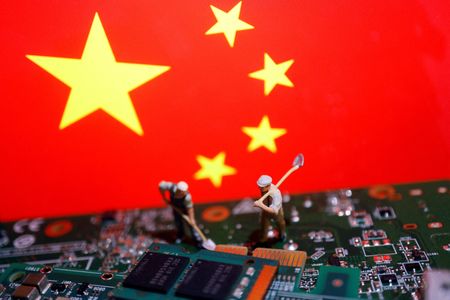By Brenda Goh, Supantha Mukherjee and Kanishka Singh
SHANGHAI/STOCKHOLM/WASHINGTON (Reuters) -China’s decision this week to restrict exports of some strategic metals has prompted more companies to re-think their reliance on the world’s No. 2 economy at a time when mounting geopolitical tensions have fed fears that more curbs could be coming.
In a move that a top Chinese trade advisor warned was “just a start,” Beijing said on Monday it would limit exports of products made from the minor metals of gallium and germanium to protect national security. That followed the U.S. decision to impose export restrictions to curb China’s access to key technologies used for artificial intelligence (AI).
The products China cited are used in semiconductors, defense technology and other high-tech industries. While the chipmaking metals account for relatively modest levels of export, China’s move reignited calls across the globe for “de-risking,” or finding other countries besides China for processing and sourcing key components used in a wider range of goods such as electric vehicle batteries.
“These actions underscore the need to diversify supply chains,” a U.S. Department of Commerce spokesperson said in a statement. “The United States will engage with our allies and partners to address this and to build resilience in critical supply chains.”
In a separate but related industry, China has about one-third of the world’s rare earth reserves, key to production of EV batteries and electronics. It has at least 85% of the world’s capacity to process rare earths into material manufacturers can use, a capability other countries want to develop.
“China produces most of these raw materials but I’d argue blocking exports would also mean they will lose revenue and force the rest of the world to find alternative sources,” said Stewart Randall, who tracks China’s semiconductor sector at Shanghai-based consultancy Intralink.
China has been the go-to for companies because it is able to export processed minerals at a lower cost than other countries. If prices rise as restrictions take hold, however, companies would have another reason to shift supply chains.
Netherlands-based Nyrstar, majority owned by trading and logistics company Trafigura, said it was looking at germanium and gallium projects in Australia, Europe and the United States to help ease shortages created by China’s curbs.
Sweden’s Ericsson said it always aims to have a diversified supplier base and “as a next step we will make an in-depth analysis of the effect of these measures, and the implications on Ericsson.”
China’s announcement came just ahead of a visit to Beijing by U.S. Treasury Secretary Janet Yellen. The metal curbs are likely to further strain U.S.-China relations as the countries vie for dominance in key sectors of semiconductors and defense technology.
In Taiwan, a senior government official said China’s restrictions on exports of gallium and germanium marked “a new wave of retaliation” in a “tit-for-tat approach.”
“Export controls accelerate, or are an accelerator, for countries including Taiwan, South Korea and Japan to reduce our dependence on China’s supply of those critical materials,” said Taiwan deputy foreign minister Roy Lee.
Japan, which starts restrictions on chipmaking tool exports to China from July 23, said it was still examining the impact of Beijing’s controls. South Korea said the short-term impact would be limited. Both countries are leading chipmakers.
Some industry watchers believed China’s metals restrictions could trigger short-term supply snags and higher prices. Others said China would feel more pain from Washington’s restrictions.
“The effect of restriction would yes be an increase in price, but not at all as painful for the rest of the world as chip restrictions are for China,” said John Strand, from Copenhagen-based Strand Consult.
But Navitas Semiconductor Corp , which makes chips that use a substance called gallium nitride, on Wednesday said it expects no adverse effects to its business from China’s export controls.
“Significant sources of gallium are available worldwide, as it is a natural by-product in the production of other metals such as aluminum,” the company said in a statement.
(Reporting by Supantha Mukherjee in Stockholm, Hakan Ersen in Berlin, Ben Blanchard in Taipei, Brenda Goh in Shanghai and Kanishka Singh in Washington; Writing by Anne Marie Roantree, editing by David Gaffen and David Gregorio)

